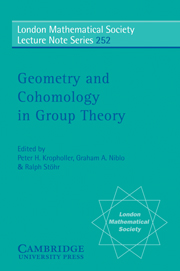Book contents
- Frontmatter
- Contents
- Preface
- List of Participants
- On the Cohomology of SL2(ℤ[1/p])
- Cohomology of Sporadic Groups, Finite Loop Spaces, and the Dickson Invariants
- Kernels of Actions on Non-positively Curved Spaces
- Cyclic Groups Acting on Free Lie Algebras
- Cohomology, Representations and Quotient Categories of Modules
- Protrees and Λ-trees
- Homological Techniques for Strongly Graded Rings: A Survey
- Buildings are CAT(0)
- On Subgroups of Coxeter Groups
- The p-primary Farrell Cohomology of Out(Fp–1)
- On Tychonoff Groups
- Word Growth of Coxeter Groups
- Poly-surface Groups
- Analytic Versions of the Zero Divisor Conjecture
- On the Geometric Invariants of Soluble Groups of Finite Prüfer Rank
- Some Constructions Relating to Hyperbolic Groups
- Free Actions of Abelian Groups on Groups
- Finitely Presented Soluble Groups
Analytic Versions of the Zero Divisor Conjecture
Published online by Cambridge University Press: 01 April 2010
- Frontmatter
- Contents
- Preface
- List of Participants
- On the Cohomology of SL2(ℤ[1/p])
- Cohomology of Sporadic Groups, Finite Loop Spaces, and the Dickson Invariants
- Kernels of Actions on Non-positively Curved Spaces
- Cyclic Groups Acting on Free Lie Algebras
- Cohomology, Representations and Quotient Categories of Modules
- Protrees and Λ-trees
- Homological Techniques for Strongly Graded Rings: A Survey
- Buildings are CAT(0)
- On Subgroups of Coxeter Groups
- The p-primary Farrell Cohomology of Out(Fp–1)
- On Tychonoff Groups
- Word Growth of Coxeter Groups
- Poly-surface Groups
- Analytic Versions of the Zero Divisor Conjecture
- On the Geometric Invariants of Soluble Groups of Finite Prüfer Rank
- Some Constructions Relating to Hyperbolic Groups
- Free Actions of Abelian Groups on Groups
- Finitely Presented Soluble Groups
Summary
INTRODUCTION
This is an expanded version of the three lectures I gave at the Durham conference. The material is mainly expository, though there are a few new results, and for those I have given complete proofs. While the subject matter involves analysis, it is written from an algebraic point of view. Thus hopefully algebraists will find the subject matter comprehensible, though analysts may find the analytic part rather elementary.
The topic considered here can be considered as an analytic version of the zero divisor conjecture over ℂ: recall that this states that if G is a torsion free group and 0 ≠ α, β ∈ ℂG, then αβ ≠ 0. Here we will study the conjecture that if 0 ≠ α ∈ ℂG and 0 ≠ β ∈ Lp(G), then αβ ≠ 0 (precise definitions of some of the terminology used in this paragraph can be found in later sections). We shall also discuss applications to Lp-cohomology.
Since these notes were written, the work of Rosenblatt and Edgar [19, 54] has come to my attention. This is closely related to the work of Section 6.
NOTATION AND TERMINOLOGY
All rings will have a 1, and to say that R is a field will imply that R is commutative (because we use the terminology division ring for not necessarily commutative “fields”). A nonzero divisor in a ring R will be an a ∈ R such that ab ≠ 0 ≠ ba for all b ∈ R\0.
- Type
- Chapter
- Information
- Geometry and Cohomology in Group Theory , pp. 209 - 248Publisher: Cambridge University PressPrint publication year: 1998
- 15
- Cited by



